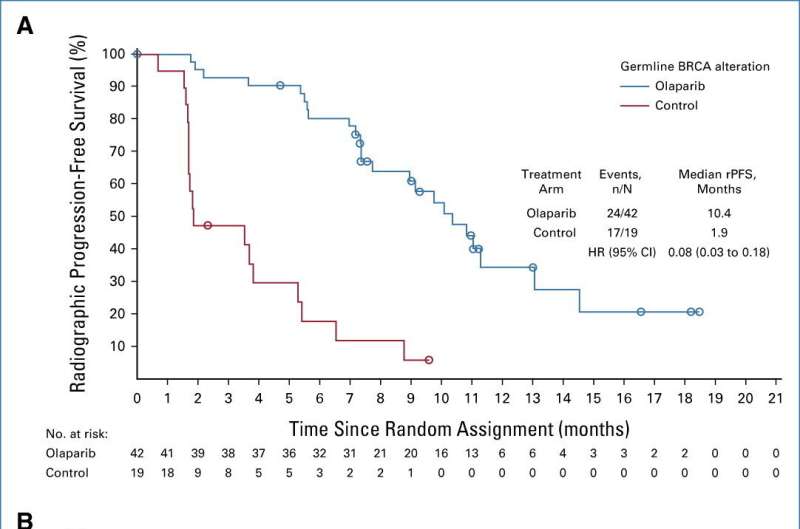This article has been reviewed according to Science X's editorial process and policies. Editors have highlighted the following attributes while ensuring the content's credibility:
fact-checked
peer-reviewed publication
trusted source
proofread
Drug found to extend survival in prostate cancer with genetic mutations

Men with hormone-resistant prostate cancer and specific genetic mutations who were treated with the PARP inhibitor drug olaparib survived longer than men treated with traditional hormone therapy, according to an analysis published in the Journal of Clinical Oncology.
Maha Hussain, MD, the Genevieve E. Teuton Professor of Medicine in the Division of Hematology and Oncology and deputy director of the Robert H. Lurie Comprehensive Cancer Center of Northwestern University, was senior author of the study.
An estimated 1 in 8 men will be diagnosed with prostate cancer during their lifetime, according to the American Cancer Society, and an estimated 280,000 new cases will be diagnosed in 2023. The average survival rate for men who develop hormone-resistant prostate cancer is about three years, and more effective treatment strategies are needed.
The cancer is normally treated with chemotherapy and other hormonal and non-hormonal agents, including PARP inhibitor drugs, which block the PARP protein from normally repairing healthy and cancer cells, causing the cancer cells to die.
In the previous phase III PROfound clinical trial, in which Hussain was one of the two international leaders for the trial, men with metastatic, hormone-resistant prostate cancer who had a specific genetic alteration and who were treated with the PARP inhibitor drug olaparib survived longer than men treated with traditional hormone treatments.
An estimated 20% of men with metastatic, hormone-resistant prostate cancer have alterations in genes associated with more aggressive disease and poorer outcomes, including BRCA1, BRAC2 and ATM.
Olaparib is currently used to treat breast, ovarian and pancreatic cancer, and in the 2020 trial, the drug showed efficacy in treating hormone-resistant prostate cancers with an inability to repair damaged DNA and whose disease had progressed after multiple prior treatments, leading to the drug's FDA approval for treating metastatic, hormone-resistant prostate cancer.
In current post hoc analysis, the investigators examined survival rates in phase III PROfound trial participants specifically with BRCA mutations whose disease had progressed and who had previously received prior therapies including taxane chemotherapy. In the trial, these patients were randomized to receive olaparib monotherapy or traditional hormone treatments (abiraterone or enzalutamide).
Overall, the average progression-free survival was 9.8 months for the olaparib group versus three months in the control group. Notably, men with BRCA2-only mutations demonstrated prolonged positive responses to olaparib treatment with an average progression-free survival rate of 10.8 months compared to 3.5 months in the control group.
Overall survival was also greater in the olaparib group (20.1 months) compared to the control group (14.4 months). These findings further reinforce the use of PARP inhibitors in this patient population, according to the authors.
"Our analysis suggests that there is superior clinical benefit with olaparib versus control both in patients who had and had not received previous taxane treatment," Hussain said.
More information: Joaquin Mateo et al, Olaparib for the Treatment of Patients With Metastatic Castration-Resistant Prostate Cancer and Alterations in BRCA1 and/or BRCA2 in the PROfound Trial, Journal of Clinical Oncology (2023). DOI: 10.1200/JCO.23.00339

















